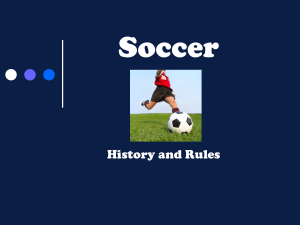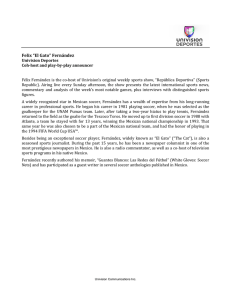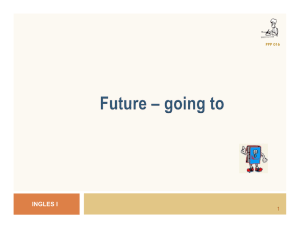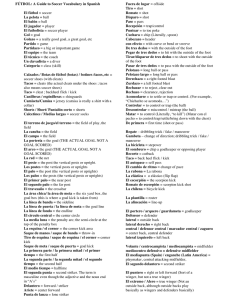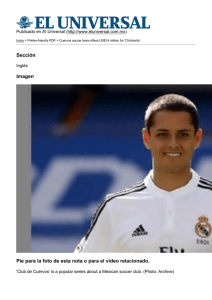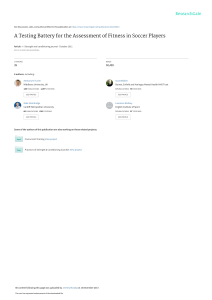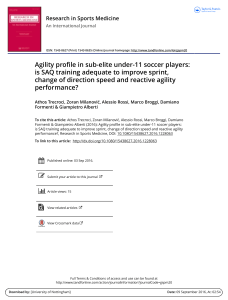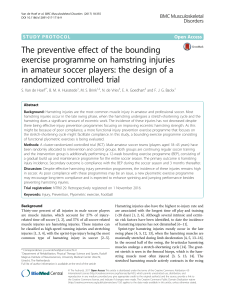Improvement of soccer nutrition knowledge about carbohydrates
Anuncio
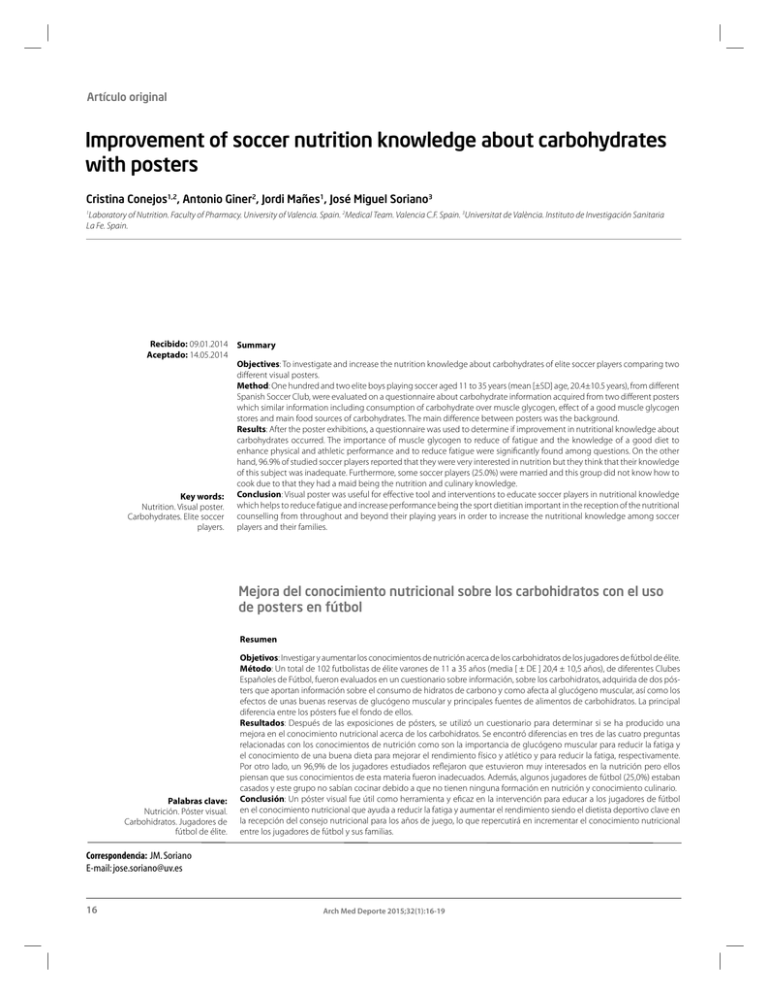
Artículo original Improvement of soccer nutrition knowledge about carbohydrates with posters Cristina Conejos1,2, Antonio Giner2, Jordi Mañes1, José Miguel Soriano3 1 Laboratory of Nutrition. Faculty of Pharmacy. University of Valencia. Spain. 2Medical Team. Valencia C.F. Spain. 3Universitat de València. Instituto de Investigación Sanitaria La Fe. Spain. Recibido: 09.01.2014 Summary Aceptado: 14.05.2014 Objectives: To investigate and increase the nutrition knowledge about carbohydrates of elite soccer players comparing two different visual posters. Method: One hundred and two elite boys playing soccer aged 11 to 35 years (mean [±SD] age, 20.4±10.5 years), from different Spanish Soccer Club, were evaluated on a questionnaire about carbohydrate information acquired from two different posters which similar information including consumption of carbohydrate over muscle glycogen, effect of a good muscle glycogen stores and main food sources of carbohydrates. The main difference between posters was the background. Results: After the poster exhibitions, a questionnaire was used to determine if improvement in nutritional knowledge about carbohydrates occurred. The importance of muscle glycogen to reduce of fatigue and the knowledge of a good diet to enhance physical and athletic performance and to reduce fatigue were significantly found among questions. On the other hand, 96.9% of studied soccer players reported that they were very interested in nutrition but they think that their knowledge of this subject was inadequate. Furthermore, some soccer players (25.0%) were married and this group did not know how to cook due to that they had a maid being the nutrition and culinary knowledge. Key words: Conclusion: Visual poster was useful for effective tool and interventions to educate soccer players in nutritional knowledge Nutrition. Visual poster. which helps to reduce fatigue and increase performance being the sport dietitian important in the reception of the nutritional Carbohydrates. Elite soccer counselling from throughout and beyond their playing years in order to increase the nutritional knowledge among soccer players. players and their families. Mejora del conocimiento nutricional sobre los carbohidratos con el uso de posters en fútbol Resumen Palabras clave: Nutrición. Póster visual. Carbohidratos. Jugadores de fútbol de élite. Objetivos: Investigar y aumentar los conocimientos de nutrición acerca de los carbohidratos de los jugadores de fútbol de élite. Método: Un total de 102 futbolistas de élite varones de 11 a 35 años (media [ ± DE ] 20,4 ± 10,5 años), de diferentes Clubes Españoles de Fútbol, fueron evaluados en un cuestionario sobre información, sobre los carbohidratos, adquirida de dos pósters que aportan información sobre el consumo de hidratos de carbono y como afecta al glucógeno muscular, así como los efectos de unas buenas reservas de glucógeno muscular y principales fuentes de alimentos de carbohidratos. La principal diferencia entre los pósters fue el fondo de ellos. Resultados: Después de las exposiciones de pósters, se utilizó un cuestionario para determinar si se ha producido una mejora en el conocimiento nutricional acerca de los carbohidratos. Se encontró diferencias en tres de las cuatro preguntas relacionadas con los conocimientos de nutrición como son la importancia de glucógeno muscular para reducir la fatiga y el conocimiento de una buena dieta para mejorar el rendimiento físico y atlético y para reducir la fatiga, respectivamente. Por otro lado, un 96,9% de los jugadores estudiados reflejaron que estuvieron muy interesados en la nutrición pero ellos piensan que sus conocimientos de esta materia fueron inadecuados. Además, algunos jugadores de fútbol (25,0%) estaban casados y este grupo no sabían cocinar debido a que no tienen ninguna formación en nutrición y conocimiento culinario. Conclusión: Un póster visual fue útil como herramienta y eficaz en la intervención para educar a los jugadores de fútbol en el conocimiento nutricional que ayuda a reducir la fatiga y aumentar el rendimiento siendo el dietista deportivo clave en la recepción del consejo nutricional para los años de juego, lo que repercutirá en incrementar el conocimiento nutricional entre los jugadores de fútbol y sus familias. Correspondencia: JM. Soriano E-mail: [email protected] 16 Arch Med Deporte 2015;32(1):16-19 Improvement of soccer nutrition knowledge about carbohydrates with posters Introduction Soccer requires players to exercise repetitively at high intensities using large muscle groups for periods of several seconds to several minutes for the duration of a match (90 min) and cover total distances ranging around 7 to 12 km/match which equivalent to an energy expenditure of approximately 1200 kcal1. The association with high-intensity and intermittent pattern of activity of soccer reliance on endogenous muscle and liver glycogen stores, which decrease in proportion to the duration and intensity of a soccer match2,3. In matches, depletion of several muscle metabolites and fuel substrates as glycogen can occur with players originating fatigue and a subsequent impairment of performance4,5. Endogenous and diet carbohydrates are important to maintain blood-glucose levels during exercise and to replace muscle glycogen6-9 but their ingestion had only a minimal influence on the immune response to exercise and injuries10. Furthermore, the importance of a good diet linked to well-trained players can enhance physical and athletic performance and to decrease the incidence of injuries during soccer matches, Furthermore, the repetition of intense exercise diminishes the neutrophil inflammatory reaction, and the recovery from physical damage may be delayed11,12. For this reason, soccer players and their families, coaches and trainers should increase the nutritional knowledge with a help from registered dietitian. The literature13-20 indicates that appropriate knowledge of nutrition is largely inadequate or misunderstood by soccer players. The aim of this study is compare two different posters to increase the nutritional knowledge of soccer players. Methods Subjects One hundred and two elite boys playing soccer participated in this study which was carried out at a training camp for different Spanish Soccer Club. Participants were aged 11 to 35 years (mean [±SD] age, 20.4±10.5 years). Written informed consent will be received from each participant and for children received from at least one parent. Figure 1. The importance of a good diet with carbohydrate increase muscle glycogen. The authentic “petrol” of soccer players. Muscle glycogen (mmol/kg) 160 Soccer player with this diet reach the game with a good storage of glycogen. Diet in 70% carbohydrates 120 Soccer player with this diet reach the game with a low-medium storage of glycogen 80 40 Diet in 50% carbohydrates 0 0 1 2 3 Days Costill & Miller (1980) The importance of a good diet help to well-trained soccer players can enhance physical and athletic performance and to decrease the incidence of injuries. If you arrive to game with a good muscle glycogen, you can: 1. Increase the performance. 2. Reduce the fatigue. The main sources of carbohydrates are the following food groups: 1. Bread, cereals, pasta and rice. Daily consumption. 2. Fruits. From 2 to 4 piece/day Arch Med Deporte 2015;32(1):16-19 17 Cristina Conejos, et al. Design Dietitian developed two identical posters, including information about of the consumption of carbohydrate over muscle glycogen, effect of a good muscle glycogen stores and main food sources of carbohydrates, as a difference in the background (see Figure 1). One of them (Poster 1) had white background and the other had an image of famous singer as background. Posters were visibly located in the football Club dressing room. Poster 1 stayed for two weeks at the beginning of the January 2009 whereas poster 2 remained for two weeks at the beginning of the April 2009. Subsequently, a short questionnaire was used in the deadline of both staying poster with the aim to evaluate the nutrition knowledge of soccer players. An expert panel from the University of Valencia, supervised by the dietitian, evaluated these materials. Materials were pilot-tested on fifteen young players to determine the correct difficulty level to allow for improvement of posters, as well as readability by the target audience. Data from these subjects were not included in the final analysis. Analysis Comparisons by two-tailed paired t tests were made on the improvement of individual questions on the poster 1 and 2. Fisher’s exact test was used to compare overall poster 1 and 2 scores. Data were analysed using the Statistics Package for the Social Sciences (SPSS Version 12.0). A sample size of 32 was required to detect the smallest significant change in improvement from 50% correct to 75% correct with a power of 80% (β=20%) and P value <0.05 (=5%). Results and discussion Short nutritional information focussed in nutrition knowledge about carbohydrate in two posters was developed and assessed according to four questions. Table 1 reflects the correct answers given by the studied soccer players. Overall, the subjects’ scores improved significantly with poster 2, as reflected by a change in the poster 1 and 2 scores (P<0.05). The questions answered incorrectly the most often on the poster 1 (questions 2-4). The poster 1 is least visual than poster 2 and some soccer players (68.7%) said that they did not see the poster 1. There was no significant difference in question 2, but the question 3 and 4 involved what the importance of muscle glycogen to reduce of fatigue and the knowledge of a good diet to enhance physical and athletic performance and to reduce fatigue, respectively (answered correctly by 15.6% of subjects). In our study, poster 2 scores increased significantly the nutritional knowledge, demonstrating that soccer players are capable of learning the carbohydrates knowledge with visual poster. The majority of studied soccer players (96.9%) reported that they were very interested in nutrition but they think that their knowledge of this subject was inadequate. Furthermore, some soccer players (25.0%) were married and this group doesn’t know how to cook due to that they had a maid being the nutrition and culinary knowledge. According to the American Dietetic Association/Dietitians of Canada/American College of Sports Medicine position21, the use of the high-carbohydrate diets (more than 60% of energy intake) in sport players have been advocated in the past. Coggan and Coyle8 and Coyle9 reflect that a diet containing 50% of the energy from carbohydrate, when energy intake is 4.000 kcal/day, will provide 500 g of carbohydrate, or approximately 7 g/kg for a 70 kg sport player and this value is sufficient to maintain muscle glycogen stores from day to day. Maughan and Burke (1999)18 observed that the consumption of carbohydrates is lower than 50% of the energy from carbohydrate in diets for soccer player during training and competition. Conejos et al.13, Iglesias-Gutiérrez et al.16 and Burke et al.22 observed that the nutritional intake and eating habits of high-level adolescent soccer players is no adequate to the nutritional recommendations for age and physical activity. These findings could signify that soccer players and their families have targets of misinformation. If such misinformed nutrition were to be continued long-term, fatigue and decrease physical and athletic performance in these players would be increased. Soccer players and their families will receive nutritional counselling from sport dietitian throughout and beyond their playing years in order to increase the nutritional knowledge and its importance. Acknowledgements This study was financially supported by University of Valencia (UVAE-20070219). Table 1. Comparison of correct answers given by soccer players after an educational program focussed in nutrition knowledge about carbohydrate based in two posters. Question Subjects answering correctly Poster 2* % P valuea 5.9 63.7 0.02 Question 1 Which is the subject of poster? 2 Do fruits contribute with carbohydrate at diet? 65.3 76.5 NS 3 Do muscle glycogen help to the reduction of fatigue? 15.7 62.7 0.03 4 Can a good diet enhance physical and athletic performance and to reduce the fatigue? 19.6 64.7 0.03 *See the difference of posters in design section a P values are based on X2. b NS=not significant. 18 Poster 1* % N Arch Med Deporte 2015;32(1):16-19 Improvement of soccer nutrition knowledge about carbohydrates with posters References 11. Rebelo AN, Candeias JR, Fraga MM, et al. The impact of soccer training on the immune system. J Sports Med Phys Fitness. 1998;38:258-61. 1. Shepard RJ, Leatt P. Carbohydrate and fluid needs of the soccer player. Sports Med. 1987;4:164-76. 2. Maughan R. Carbohydrate-electrolyte solutions during prolonged exercise. In: Perspectives in Exercise Science and Sports Medicine. Vol. 4: Ergogenics: Enhancement of Performance in Exercise and Sport. Lamb DR, Williams MH (Eds.) Carmel. Brown & Benchmark 1991;35-85. 12. Conejos C, Giner A, Mañes J, et al. Dietary intake of nutrients of great interest in immunonutrition to prevent muscle damage in soccer players. Proc Nutr Soc. 2008;67:E33. 13. Conejos C, Giner A, Mañes J, et al. Energy and nutritional intakes in training days of soccer players according to their playing positions. Arch Med Dep. 2011;141:29-35. 14. Hawley JA, Dennis SD, Noakes TD. Carbohydrate, fluid and electrolyte requirements of the soccer player: a review. Int J Sport Nutr. 1994;4:221-36. 3. Shepard RJ. Meeting carbohydrate and fluid needs in soccer. Can J Sports Sci. 1990;15:165-71. 15. Heredeen F, Fellers RB. Nutrition knowledge of college football linemen: Implications for nutrition education. J Am Diet Assoc. 1999;99:S38. 4. Criswell D, Powers S, Lawler J, et al. Influence of carbohydrate-electrolyte beverage on performance and blood homeostasis during recovery from football. Int J Sport Nutr. 1991;1:178-91. 16. Iglesias-Gutiérrez E, García-Róves P, Rodríguez C, et al. Food habits and nutritional status assessment of adolescent soccer players. A necessary and accurate approach. Can J Appl Physiol. 2005;30:18-32. 5. Jacobs I, Westlin N., Ramusson M, et al. Muscle glycogen and diet in elite soccer players. Eur J Appl Physiol. 1982;48:297-302. 17. Maughan RJ. Energy and macronutrient intakes of professional football (soccer) players. Br J Sports Med. 1997;31:45-7. 6. Ivy JL, Lee MC, Broznick JT, et al. Muscle glycogen storage after different amounts of carbohydrate ingestion. J Appl Physiol. 1988;65:2018-23. 18. Maughan RJ, Burke LM. Diets for soccer player during training and competition. Sci Sport.1999;14:227-32. 7. Burke LM. The complete guide to food for sports performances. 2nd edition. Sydney: Allen and Unwin. 1995. 19. Ruiz F, Irazusta A, Gil S, et al. Nutritional intake in soccer players of different ages. J Sports Sci. 2005;23:235-42. 8. Coggan AR, Coyle EF. Carbohydrate ingestion during prolonged exercise: effects on metabolism and performance. In: Holloszy JO (Ed.) Exercise and Sports Science Reviews. Baltimore. Williams &Wilkins 1991;1-40. 20. Tartamella LD. Kemler D.S. Principles of sports nutrition: does nutrition education enhance athletes’ knowledge? J Am Diet Assoc. 1996;96:S88. 9. Coyle EF. Substrate utilization during exercise in active people. Am J Clin Nutr. 1995; 61S: 968S-79S. 10. Bishop NC, Blannin AK, Robson PJ, et al. The effects of carbohydrate supplementation on immune responses to a soccer-specific exercise protocol. J Sports Sci. 1999;17:78796. 21. American Dietetic Association/Dietitians of Canada/American College of Sports Medicine (ADA/DC/ACSM). Position of the American Dietetic Association, Dietitians of Canada, and the American College of Sports Medicine: Nutrition and athletic performance. J Am Diet Assoc. 2009;109:509-27. 22. Burke LM, Hawley JA, Wong SH, Jeukendrup AE. Carbohydrates for training and competition. J Sports Sci. 2011; Suppl 1:S17-27. Arch Med Deporte 2015;32(1):16-19 19
